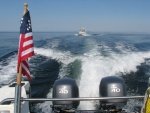Yellowstone":2s5e5nd5 said:
I know this topic has been beaten to death, but perhaps it has created unnecesary anxiety for some boaters. The latest Boating magazine Nov/Dec. has an article on boating myths, among them "Those who run offshore with one engine will eventually regret it." See pp. 51-56. A number of myths (I believed in several) were exposed. Interessting article. Yellowstone
Having had five failures on the water with my CD 16 Cruiser, I learned:
1) Even if you have a boat towing service subscription, they can't always get to you in time to avert a potentially dangerous situation.
2) Boat towing services can't always get your boat back into a slip if the area aound it is too tight
3) No matter what most people say, a second motor is necessary, because not only do our modern primary engines fail, but they do so frequently in any geographical area due to a wide range of issues to include spinning a prop, bad fuel, mechanical failure or electrical failure.
4) It is so true how many boaters don't even carry anchors or rope. I discovered this first hand when a weekend boater with a 23 foot boat expected me to tow him to safety. With approx. 7 young adults on board, he had no anchor, 30 feet of rope, and he did not have a boat towing subscription service. I hate going out on weekends, because at least in the Northeast, there are too many ignorant boaters who don't know the rules of the road, don't know how to safely operate their boats, and who are ill prepared with respect to safety equipment and procedures. It is a prescription for a disaster.
5) Radar, Chartplotter, radio w/AIS, back-up Nav systems, adequate fuel reserves, water on board, and even things mandated by law but are not consistently followed like life preservers, fire extinguishers, flares and other signaling devices -- all are essential safety equipment to help to ensure survival in emergencies.
Personally, I think C-Brats people really get it that boating can be dangerous if not approached with a serious mind. We prize safety and function over form and economics, which is why we collectively have, for the most part, an excellent safety record.

